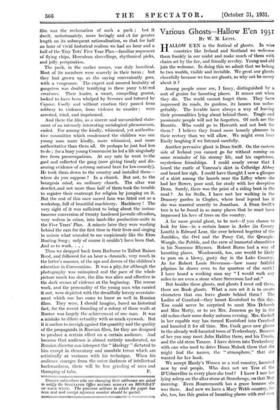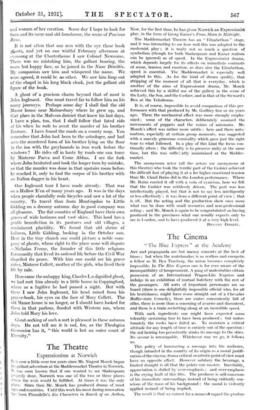Various Ghosts—Hallow E'en 1931
BY W. M. LETTS.
HALLOW E'EN is the festival of ghosts. In wise countries like Ireland and Scotland we welcome them frankly in our midst and make much of them with chairs set by the fire, and friendly revelry. Young and old join the welcome. In doing this we admit that we belong to two worlds, visible and invisible. We greet our ghosts cheerfully because we too are ghosts, so why not be merry about it ?
Among people some are, I fancy, distinguished by a sort of genius for haunting places. It comes out when they die. The world cannot forget them. They have impressed its roads, its gardens, its houses too unfor- gettably. The lovable have always a way of leaving their personalities lying about behind them. Tragic and passionate people will not be forgotten. Of such are the Brontës. Who could go to Haworth and not look for them ? I believe they found more homely pleasure in their rectory than we will allow. We might even hear Emily laughing if we listened carefully.
Another pervasive ghost is Dean Swift. On the eastern side of Ireland you cannot go far without coming on some reminder of his stormy life, and his capricious, mysterious friendships. I could nearly swear that I heard the rustle of Vanessa's skirt in Celbridge Abbey and heard her sigh. I could have thought I saw a glimpse of a skirt among the laurels near the Liffey where she had her Bower, poor soul, for study with her deceptive Dean. Surely, there was the print of a riding boot in the mud ? As for Stella, I have met her walking in the Deanery garden in Clogher, where local legend has it she was married secretly to Jonathan. A Dean Swift's tree is to be found in so many places that he must have impressed his love of trees on the country.
A far more genial ghost, to be met—if you choose to look for him—in a certain house in Ardee (in County Louth) is Edward Lear, the ever beloved begetter of the Jumblies, the Owl and the Pussy Cat, the Qwangle- Wangle, the Pobble, and the crew of immortal absurdities in his Nonsense Rhymes. Robert Burns had a way of haunting places. Wordsworth, too, one would be likely to pass on a blowy, gusty day in the Lake Country. As for Robert Louis Stevenson—how many faithful pilgrims he draws even to far quarters of the earth ! I have heard a working man say " I would walk any miles to see even a stone where Stevenson had sat."
But besides these ghosts, real ghosts I must call them, there are Book ghosts. What a rare art it is to create characters that can leave ghosts behind them ! The Ladies of Cranford—they haunt Knutsford to this day. You could never be surprised to meet Miss Deborah and Miss Matty, or to see Mrs. Jameson go by in the old sedan-chair some dusky autumn evening. Mrs. Gaskell in her capable way has turned Knutsford into Cranford and haunted it for all time. Mrs. Craik gave new ghosts to the already well-haunted town of Tewkesbury. Because of her you may meet John Halifax there, and his Ursula, and the old stern Tanner. I have driven into Tewkesbury with one who used to drive Diana Mulock there that she might find the names, the " atmosphere," that she wanted for her book.
We accept Hardy's Wessex as a real country, haunted now by real people. Who does not see Tess of the D'Urbervilles in every place she trod ? I know I saw her lying asleep on the altar stone at Stonehenge, on that May morning. Even Bournemouth has a grace because she was there. And now we have a Mary Webb country, for she, too, has this genius of haunting places with real men and women of-her creation. - Some day -I hope to look for Sarn and its mere and old farmhouse, the scene of Precious Bane.
It is not often that one gees with the eye these book ghosts, and yet on one wistful February afternoon at evensong at the Charterhouse I saw Colonel Newcome. There was no mistaking him, the gallant bearing, the worn but happy face, as he joined in the Nunc Dimittis. My companion saw him and whispered the name. We were agreed, it could br, ,ao other. We saw him limp out of the chapel in his long black cloak, just the gallant old figure of the book.
A ghost of a gracious charm beyond that of most is John Inglesant. One must travel far to follow him on his many journeys. Perhaps some day I shall find • the old Manor house near Mahnesbury where he grew up, and that place in the Malvern district that knew his last days. I have a plan, too, that I shall follow that fated ride of his when he rode to avert the murder of his brother Eustace. I have found the roads on a county map. You remember that John had been to the astrologer, and had seen the murdered form of his brother lying on the floor in the inn with the greyhounds in iron work before the windows ? He rides off in haste by roads one can trace by Minterne Parva and Cerne Abbas. I see the fork where John hesitated and took the longer turn by mistake, so that the murder was done in that upstairs room before he reached it, only to find the corpse of his brother with an Italian dagger in his heart.
One Inglesant tour I have made already. That was on a Hallow E'en of many years ago. It was in the days when people cheerfully rode bicycles and saw a lot of the country. To travel thus from Huntingdon to Little Gidding on a dreamy autumn day in good company was all pleasure. The flat counties of England have their own graces of wide horizons and vast skies. This land has a gentle benediction in its pastures and old villages, a reminiscent placidity. We found that old shrine of holiness, Little Gidding, - basking - in the OCtober sun. Here in the tiny church one could picture a noble com- pany of ghosts, whose right to the place none will dispute .—Nicholas Ferrar, the founder of this little religious Community that lived its ordered life before the Civil War 'dispelled its peace. With him one could see his grave sister, Mistress Collett, mother of the girls, who lived their life by rule.
here came the unhappy king, Charles I, a dignified ghost, we had met him already in a little house in Coppingford, where as a fugitive he had passed a night. But with these I saw John Inglesant, his head raised from his prayer-book, his eyes on the face of Mary Collett. The old Manor house is no longer, or I should have looked for them in that parlour, flooded with 'Western sun, where John told Mary his love.
Ghost-seeking of such a sort is pleasant in these autumn days. Do not tell me it is sad, for; as the Theologica Germanica has it, " this world is but an outer court of Eternity."







































 Previous page
Previous page